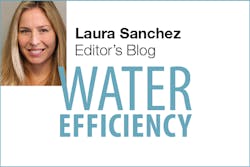It’s the season of giving and during the holidays, many of us celebrate by sharing gifts. A few years ago, I became interested in microlending while searching for a way to, in some small way, do a little global good. I thought I would share my personal experience here as a means of exploring microlending’s potential impact relevant to water professionals and water projects worldwide.
Microlending is an economic development system in which small loans are given by individuals (rather than banks) to enterprising people often overlooked by traditional lenders. The idea behind it is that the loan not only helps the individual break the cycle of poverty, but also can become the start of a positive economic pattern that benefits the entire community. The transformative model was developed and popularized by Nobel Peace Laureate Mohammad Yunus.
Yunus, an economics professor, was working in Bangladesh, where he met Sufiya Begum, a mother of three who made bamboo stools. She could not afford the 22-cent cost of the raw materials, so she borrowed that amount from store owners and in return sold her stools exclusively through them. They set their prices so low, however, that she cleared only two cents per stool, creating a continual deficit. Yunus recognized that it would take 22 cents to break the poverty cycle.
He found other entrepreneurs in similar situations and, one month, loaned a total of 27 dollars as an experiment. The economic model was successful, and the loans repaid. Out of this, Bangladesh’s Grameen Bank was born. Since then, the concept has inspired other organizations to offer small-scale loans to people around the world.
There are a number of microlending organizations to choose from today. I selected an organization called Kiva because of the fact that the website does not take a percentage of the lender’s capital, instead directly connecting lenders with borrowers. The organization funds these loans with crowd-sourced capital that they loan at zero percent interest to field partners.
I scrolled through the website, reading each prospective loan client’s background sheet, business plan, and goals. I found both international and domestic projects to support and was touched by their stories.
Ultimately, I chose to help fund a loan for a school in Uganda in need of a UV water filtration system and 1,000-liter tank. The school’s director explained in her essay that she uses a large amount of the school’s budget on firewood to boil water for drinking. She felt that access to clean water would increase student focus and attendance since water-borne illnesses often prevent children from coming to school. In turn, she planned to repay the loan with the fees the school collects each term. Eventually, the savings could be dedicated to books and other important curricular materials.
By investing in the school’s UV water filtration system and tank, I felt like I had contributed in a tiny way to something positive—like my pocket change was helping create bigger change. Over time, the loan was repaid and I chose to reinvest it in another water project, this time in Nicaragua. What are your thoughts? Do you feel that microlending has the potential to help advance water technologies worldwide? What sort of projects would interest you?
